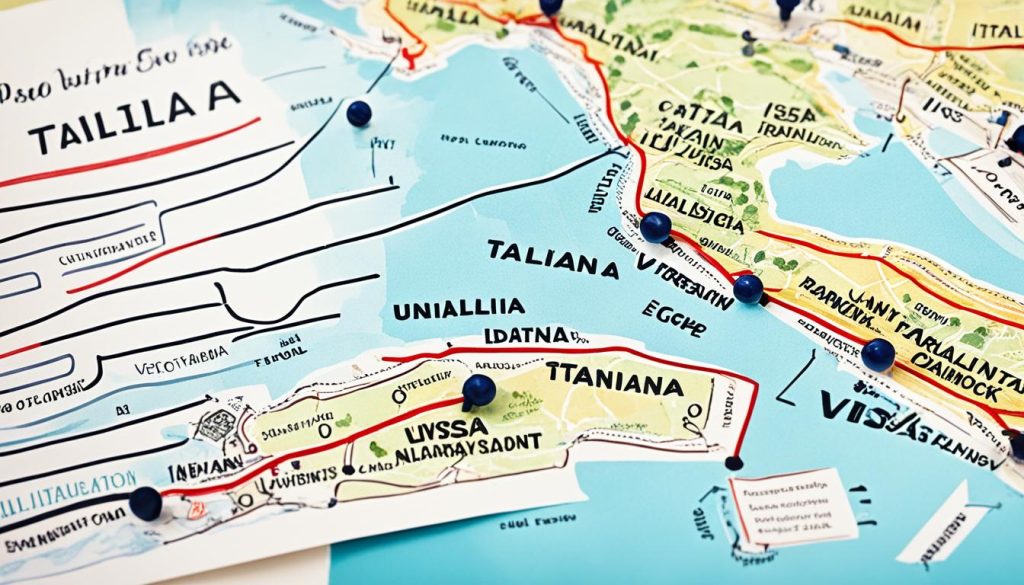Italian immigration can seem complex, especially for UK nationals looking for work in Italy after Brexit. This guide provides clear information on various work visas and residence permits, also known as permesso di soggiorno. It also explains how to apply.
- Introduction to Italian Work Visas and Permits for UK Nationals
- Entry Requirements for UK Nationals
- Understanding the Schengen Visa Waiver for Short-term Work
- Do You Need a Visa or Permit?
- Applying for an Italian Work Visa
- Documents Required for Italian Work Visas and Permits
- Steps to Apply for an Italian Work Visa
- Transferring to an Italian Branch of a UK-based Company
- Providing Services to a Client in Italy
- Working for an Italian Company on an Italian Employment Contract
- Self-Employed UK Nationals in Italy
- Setting up an Innovative Start-up in Italy
- Investing in Italy: Work Visas and Permits
- Research Work in Italy
Because of Brexit, it is vital for UK citizens to know what they need to work in Italy. You need the right work visa and to get an Italian residence permit. Knowing about Italian immigration rules will help you move smoothly and follow the law.
This guide is for UK citizens intending to work in Italy. It gives you useful information to confidently start your work life in Italy.
Key Takeaways
- Various types of work visa Italy offers and residence permits (permesso di soggiorno) available.
- The importance of understanding changes post-Brexit for UK nationals.
- Detailed steps in the application process for Italian immigration.
- Importance of verifying requirements with Italian government authorities.
- Essential compliance with Italian immigration regulations to legally work in Italy.
- Preparation of documentation for obtaining a work visa and residence permit.
Introduction to Italian Work Visas and Permits for UK Nationals
Understanding how to get work visas and permits is key for UK nationals aiming to work in Italy, especially after Brexit. Brexit has made it harder for UK citizens to find jobs in Italy. Now, they must follow specific steps to legally work and live there.
This guide covers the basic needs for Italian work visas. You must have a job offer and meet the immigration rules. There are many visa types, for skilled workers to self-employed people. It’s crucial to follow these laws closely.
Applying for an Italian work permit means you’ll need lots of documents. These include proof of a job, identity papers, and sometimes, your educational achievements. Making sure your application meets all the rules is very important.
It’s a good idea to check the most recent information with the Italian embassy or related authorities. Our aim is to help UK nationals easily understand how to apply for an Italian work visa.
Entry Requirements for UK Nationals
Before you start your Italian work journey, you need to know the entry rules for UK citizens. Checking these rules helps make your move easy and keeps trouble away.
Passport Requirements
To travel to Italy, UK citizens need a valid passport. Make sure your passport is valid during your stay. It’s best if it is valid for a bit longer than you plan to stay. Italy is in the Schengen area, so you must follow Schengen rules about passport validity and border checks.
Health Insurance
It’s vital to have good health insurance for your stay in Italy. Your insurance should cover you for your whole visit, protecting you from unexpected health problems. You can use the European Health Insurance Card (EHIC) or get a private policy. Either way, all UK citizens working in Italy need good insurance cover.
Proof of Accommodation
You also need to show where you’ll be staying in Italy. This could be a rental contract, a hotel reservation, or an invitation letter from friends or relatives. By proving you have a place to stay, you meet another important requirement for UK nationals.
Understanding the Schengen Visa Waiver for Short-term Work
The Schengen visa waiver lets UK nationals do specific business activities in Italy without a visa. It’s great for short-term work in the Schengen area.
Business-related Activities Allowed Without a Visa
Under this waiver, UK nationals can go to business meetings, trade fairs, and have short-term training in Italy. This makes it easy for them to do important business without visa hassles.
Duration of Stay Under the Schengen Visa Waiver
UK nationals can stay in Italy for up to 90 days within any 180-day period with this waiver. This limit is for the whole Schengen area. So, it’s important to plan your visits well to stay within these limits.
Do You Need a Visa or Permit?
Finding out if you need a visa or permit for Italy can get tricky. This is because there are many rules and exceptions. But it’s very important for UK nationals to get this right. This ensures they follow Italy’s immigration rules.
Types of Work Exempt from Visa or Permit Requirements
Some jobs in Italy don’t need a visa or permit. For example, going to Italy for short business trips, like meetings or conferences, usually doesn’t require a visa. Also, if you’re moving within your company to work in a different EU country, you might not need a special Italian visa.
Checking with Italian Authorities
It’s always a good idea to check with Italian officials about your visa or permit needs. Italy’s immigration system is unique and can change. Getting the most current advice will help you avoid problems with your work in Italy.
Applying for an Italian Work Visa
For UK nationals, knowing how to apply for an Italy work visa application is key. You must first get a visa to enter Italy. After that, you need a residence permit for longer periods. Let’s look at the steps for applying for a visa:
-
Initial Application: To start, you fill in an Italy work visa application at an Italian consulate or embassy near you. Make sure you have all needed documents, like a valid passport and photos.
-
Employer Involvement: Italian employers are crucial in this process. They must get a work permit, known as Nulla Osta, from the local immigration office. This permit helps support your visa application.
-
Types of Visas: There are different visas for different kinds of work. A standard work visa suits long-term jobs. There are also permits for seasonal work or transfers within companies for managers and specialists.
-
Decreto Flussi: The Decreto Flussi is a key part of the application. It’s a decree that sets how many non-EU workers can enter Italy. It’s important to apply when the quota opens.
Getting an Italian work permit requires careful attention to the visa application process. Make sure all requirements are met and your documents are correct. This will help make moving to Italy for work easier.
Documents Required for Italian Work Visas and Permits
If you’re a UK national looking to work in Italy, you need to prepare a set of documents. It’s very important to have all your papers ready. This will meet Italy’s legal needs for work.
Standard Document Checklist
Here’s what you need for an Italian work visa:
- Valid passport with at least two blank pages.
- Completed visa application form.
- Passport-sized photos in the right format.
- Proof of a job or contract from an Italian employer.
- Where you’ll live in Italy.
- Your professional qualifications and certificates.
- Health insurance for your entire stay.
- Bank statements to show you have enough money.
Special Document Requirements Based on Employment Type
Some jobs need more papers. For example:
- Intra-company transfers: A transfer agreement and details about your role and how long you’ll stay.
- Self-employed individuals: Papers showing your business in Italy, a business plan, and proof of money.
Legalisation and Translation
Your documents must meet Italy’s legal standards. This often means you need to get them legalised and translated. Legalisation might involve an Apostille stamp or going to a consulate. Also, if your documents aren’t in Italian, you must have them translated by someone official.
Getting all your documents right will really help you get your work permit for Italy.
Steps to Apply for an Italian Work Visa
The journey to get an Italian work visa starts with some important steps. First, your employer has to take on some duties. Then, you’ll move on to filling out your application and learning about how long it will take.
Employer Responsibilities
To kick off your work visa application for Italy, you need your employer’s help. They must get a Nulla Osta (work permit) for you. This means they have to send in documents. These show your job offer is real and they’re following local job laws. Having your employer’s support is key to your visa application.
Application Process
After getting the Nulla Osta, you can start applying for your visa. You need to hand in your visa application form and other documents. These include your passport, visa forms, somewhere to live, and health insurance. Submit these at an Italian embassy or consulate in the UK. Be ready for an interview and make sure your papers are right to avoid waiting longer.
Timeline for Visa Processing
The time it takes to get your visa can change a lot. It depends on the work visa type and how many people are applying. It’s smart to begin early to deal with any surprise hold-ups. Usually, it takes from a few weeks up to a couple of months. Once you have your visa, you must register with Italian officials when you get there. This is to make sure your work and living status in Italy are official.
Transferring to an Italian Branch of a UK-based Company
Moving to an Italian branch of your UK-based company can be thrilling. Yet, it’s vital to know the permits needed for a smooth move. This must be within the Italian immigration laws.
EU Intra-Company Transfer Permit (EU ICT)
The EU ICT permit is for managers, specialists, and trainees. They are moving within their multinational company to Italy. This permit allows for work across the EU. It helps professionals complete tasks in different member states. You must show your role and your contribution to the company in Italy. The EU ICT permit can last up to three years for managers and specialists. Trainees can get it for up to one year.
Standard Intra-Company Transfer Permit (ICT)
The standard ICT permit is for those not covered by the EU ICT. It’s for those moving to an Italian branch of their company. Like the EU ICT, it’s for managers and specialists. However, it has different application processes and requirements, suiting the Italian legal system.
Each permit type requires careful checking of eligibility, documents, and timelines. Following these rules closely is key for a successful move.
Providing Services to a Client in Italy
UK nationals planning to work in Italy must look into specific requirements and permits. This depends on the service they aim to provide. Knowing the kind of services and the needed visas and permits is crucial for following Italian laws.
Types of Services Covered
UK nationals offering services like professional advice, IT consultancy, or legal help in Italy need to pay attention to the rules. It’s vital to check if your service requires a business services visa or other authorisations. This ensures everything is in order for working with Italian clients.
Required Permits and Visas
Different services in Italy might need various permits or visas. For instance, long-term consultancy usually needs a business services visa. Meanwhile, short-term tasks may only require the Schengen visa waiver. Always verify with Italian authorities to be fully compliant and provide services smoothly in Italy.
Working for an Italian Company on an Italian Employment Contract
For UK nationals looking at jobs with an Italian company, it’s important to get the hang of an Italian employment contract. The job market in Italy has various types of contracts. Each of them, like permanent contracts (Contratto a Tempo Indeterminato) and fixed-term contracts (Contratto a Tempo Determinato), has its details.
Being employed under an Italian employment contract means you’ll have to follow Italy’s work rules. This includes minimum pay, hours of work, rights, and how one might be let go. Knowing these rules well protects both workers and bosses, making sure everyone is treated fairly.
Working in Italy also means understanding your job duties and what your employer must do. For example, companies have to pay into social security for their staff. Workers need to know about their safety, holiday rights, and what benefits the company offers them.
Additionally, an Italian work contract often has details like what your job will involve, how much you’ll earn, trial periods, and rules about secrets and not working for competitors. Getting familiar with these things helps in doing your job well and keeps everything clear between employees and employers.
- Permanent Contracts (Contratto a Tempo Indeterminato)
- Fixed-term Contracts (Contratto a Tempo Determinato)
- Responsibilities and rights under Italian work regulations
- Employee benefits and social security contributions
Finally, working for an Italian company means really understanding the Italian employment contract and all the work rules in Italy. This know-how ensures a good working relationship and that everyone knows their responsibilities and rights.
Self-Employed UK Nationals in Italy
For UK nationals looking into self-employment in Italy, getting the right permits and knowing the local rules is key. Starting your own business in Italy means going through the visa process. It also means following laws meant just for self-employed people.
Permits and Visas for Self-Employment
Getting an Italian freelance visa is vital for those aiming to work for themselves in Italy. This visa is for people from outside the EU, including those from the UK. They might want to start a business or freelance. You’ll need to show you have enough money, a solid business plan, and the right qualifications. You also have to show how your work will help the Italian economy.
Regulations to Follow
After you get your Italian freelance visa, you must follow certain rules. This means registering your business with the local Chamber of Commerce and getting a VAT number. You must keep up with taxes, keep accurate financial records, and make sure your business follows Italian laws. It’s also wise for UK nationals to join professional groups in their field. This can help with credibility and networking.
Understanding and following these steps is crucial for UK nationals. By doing so, they can make a successful move to self-employment in Italy. This opens up opportunities for a fulfilling business in a lively market.
Setting up an Innovative Start-up in Italy
For folks from the UK who love inventing, Italy is a great place to start a business. It offers great chances and easy steps to follow. If you have new tech ideas or unique business plans, Italy is ready to welcome you.
Special Permits for Start-up Founders
The Italian government has special permits to help start-up founders. The Italian start-up visa is for people from outside the EU. It makes setting up innovative companies in Italy easier. You must have a strong business plan, enough money, and meet innovation standards set by Italian officials.
Support from Italian Authorities
Italy offers more than the entrepreneur visa Italy. It gives a lot of support to help new businesses succeed. There’s help with understanding the local business scene, money, and links to innovation hubs. Also, different regions in Italy have programmes to help start-ups grow. They provide guidance and financial help.
Italy is a welcoming place for UK entrepreneurs wanting to start innovative businesses. Its great support system and easy visa process make it a top choice. The Italian start-up visa and start-up establishment assistance help new businesses do well.
Investing in Italy: Work Visas and Permits
For those looking at Italy for investment, the country is ripe with opportunities. These can help in getting the work visas and permits you need. The Italian government welcomes economic contributions, making Italy a top spot for investors.
Investment Opportunities
Italy offers various investment options. This includes real estate, start-ups, and the growing tech field. There are also chances in tourism, manufacturing, and agribusiness. Each area offers unique benefits and the potential for big profits.
Permits Required for Investors
An investment visa Italy is for non-EU folks ready to invest a lot of money. There are also business investment permits to make living there easier. An Italian investor residence permit lets investors and their families live in Italy. It also opens up travel in the Schengen area.
The process to get these permits is made simple to draw in foreign investment. You need to show your investment, meet money requirements, and prove it helps the Italian economy. This way is designed to attract and keep foreign investors, helping Italy’s economy grow.
Research Work in Italy
If you’re from the UK and want to do research in Italy, you need to know about visas. Italy has different visas for academics and researchers. To do scientific research or academic work, getting the right visa is essential. The National Research Council and Italian universities often sponsor these visas.
To get a research visa for Italy, you need an invite or contract from a recognised institution. This must show your qualifications and your research plan. Places like the University of Bologna work with researchers from abroad. After getting a visa, you’ll also need a permit to do your research legally in Italy.
Italy’s rules help bring in international researchers and encourage science work together. The Researcher’s Card makes things easier for researchers in Europe, including Italy. You should talk to the Italian consulate or other official places. They can help you make sure you follow the law and know about any rule changes.













